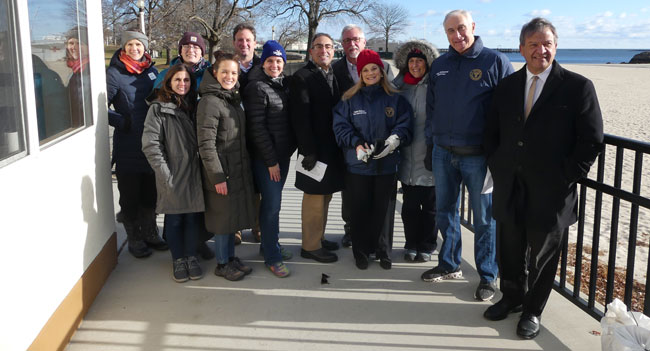
Long Island Sound Resilience Planning Support Program press event, Rye Town Park, December 6, 2024. (L-R) LIS SRC Extension Professionals Deb Visco Abibou, Elizabeth Hornstein, Sarah Schechter, Sarah Schaefer-Brown, Sara Powell; Village of Rye Brook Mayor Jason Klein, US EPA LISS Director Mark Tedesco, CT Sea Grant Director Sylvain De Guise, Town of Rye Administrator Debbie Reisner, NY Sea Grant Director Rebecca Shuford, Town of Rye Supervisor Gary Zuckerman, Westchester County Executive/Incoming U.S. Congressman George Latimer. Credit: Robert Burg/LISS
Contacts:
Elizabeth Hornstein, NYSG Sustainable and Resilient Communities Extension Professional, Suffolk County, E: eeh78@cornell.edu, Phone: (631) 824-4575
Sarah Schaefer-Brown, NYSG Sustainable and Resilient Communities Extension Professional, Nassau County, E: scs292@cornell.edu, Phone: (516) 832-2591
Sara Powell, NYSG Sustainable and Resilient Communities Extension Professional, Westchester County, E: slp285@cornell.edu, Phone: (914) 369-1591
NYSG is successfully implementing responsive programming to address complex challenges in coastal communities
Stony Brook, NY, May 27, 2025 - Lack of capacity, expertise, and resources to prepare and apply for funding are the main barriers to planning, designing, and implementing sustainability and resilience-focused projects for communities across New York and Connecticut. These issues were identified by a regional Needs Assessment conducted in 2021 by New York Sea Grant’s (NYSG) Long Island Sound Study (LISS) Sustainable and Resilient Communities (SRC) Extension Professionals.
To address these barriers, NYSG and Connecticut Sea Grant launched a Grant Writing Assistance Program in 2022 with funding from the U.S. Environmental Protection Agency through LISS. This program facilitates the contracting of a grant-writing consultant to help communities develop successful grant proposals. In 2023, a Planning Support Program was launched, matching participating communities with qualified contractors to help them with the identification and development of resilience projects.
The first two years of the Grant Writing Assistance Program reduced staffing and capacity barriers in 24 communities and helped communities receive $672,969 in grants from state and regional funding opportunities, e.g., the New York State Department of Environmental Conservation’s Water Quality Improvement Program and the National Fish and Wildlife Foundation’s Long Island Sound Futures Fund.
In the first year of the Planning Support Program, nearly $1.1 million was awarded to 15 Long Island Sound coastal communities (10 in NY) to support climate vulnerability assessments and resilience plans, watershed-based conservation plans, natural resource inventories, conceptual design plans, and flood mitigation studies.
NYSG developed the Long Island Sound Grant Writing Assistance and Planning Support programs as innovative and responsive approaches for tackling complex barriers to advance the implementation of sustainability and resilience-focused projects across the Long Island Sound coastal watershed.
Project Partners/Funders:
• Long Island Sound Study
• Connecticut Sea Grant
• Funding: U.S. Environmental Protection Agency
More Info: New York Sea Grant
Established in 1966, the National Oceanic and Atmospheric Administration (NOAA)’s National Sea Grant College Program promotes the informed stewardship of coastal resources in 34 joint federal/state university-based programs in every U.S. coastal state (marine and Great Lakes) and Puerto Rico. The Sea Grant model has also inspired similar projects in the Pacific region, Korea and Indonesia.
Since 1971, New York Sea Grant (NYSG) has represented a statewide network of integrated research, education and extension services promoting coastal community economic vitality, environmental sustainability and citizen awareness and understanding about the State’s marine and Great Lakes resources.
NYSG historically leverages on average a 3 to 6-fold return on each invested federal dollar, annually. We benefit from this, as these resources are invested in Sea Grant staff and their work in communities right here in New York.
Through NYSG’s efforts, the combined talents of university scientists and extension specialists help develop and transfer science-based information to many coastal user groups—businesses and industries, federal, state and local government decision-makers and agency managers, educators, the media and the interested public.
New York Sea Grant, one of the largest of the state Sea Grant programs, is a cooperative program of the State University of New York (SUNY) and Cornell University. The program maintains Great Lakes offices at Cornell University, SUNY Buffalo, Rochester Institute of Technology, SUNY Oswego, the Wayne County Cooperative Extension office in Newark, and in Watertown. In the State's marine waters, NYSG has offices at Stony Brook University and with Cornell Cooperative Extension of Nassau County on Long Island, in Queens, at Brooklyn College, with Cornell Cooperative Extension in NYC, in Bronx, with Cornell Cooperative Extension of Ulster County in Kingston, and with Cornell Cooperative Extension of Westchester County in Elmsford.
For updates on Sea Grant activities: www.nyseagrant.org, follow us on social media (Facebook, Twitter/X, Instagram, Bluesky, LinkedIn, and YouTube). NYSG offers a free e-list sign up via www.nyseagrant.org/nycoastlines for its flagship publication, NY Coastlines/Currents, which it publishes 2-3 times a year.